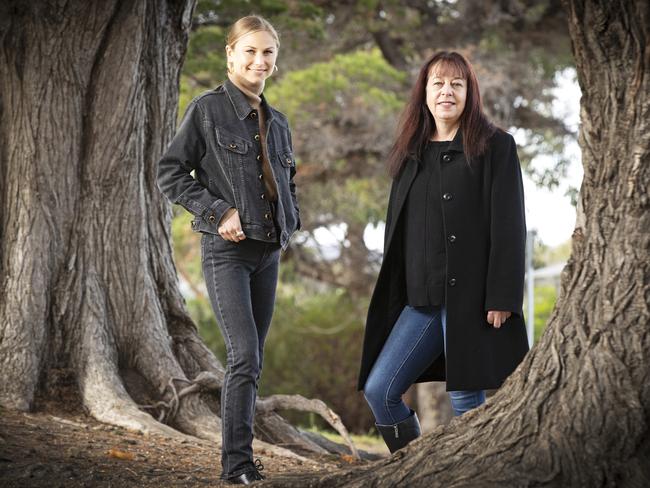State Government renames sexual crimes to better reflect the true nature of offending
The courageous women behind an overhaul of legal language which sanitises, minimises and even excuses sexual crimes in Tasmania have been praised for their “vitally important” work.
Tasmania
Don't miss out on the headlines from Tasmania. Followed categories will be added to My News.
As Janelle O’Connor becomes the first rape survivor in Tasmania to speak out under new laws which no longer gag all sexual assault victims, experts have praised the courage of survivors who have driven the #LetHerSpeak campaign.
Last year, Grace Tame and Tameka Ridgeway both took their individual fights to be named to the Supreme Court of Tasmania, with legal support and funding organised via the campaign.
The women were both victorious and have become strong advocates for law reform since.

Patty Kinnersly, the CEO of Our Watch — the peak national body in the prevention of violence against women and children — has praised all the survivors involved in the law reform.
“Stories from survivor advocates have always been very powerful,” she said.
“Their work has been vitally important in getting this issue on the agenda and achieving this historic change to the law.
“When survivors are able to tell their own stories, on their own terms, it can have a massive impact on changing community attitudes, values and beliefs about violence against women.
“This change will be important for centring women’s voices into commentary on this issue.
“It may also encourage other survivors to come forward to tell their story if they wish to, which will be important to reduce the stigma and shame they can feel.”
Launched by the Mercury in 2018, the #LetHerSpeak movement expanded in 2019 to also call for an overhaul of legal language which sanitises, minimises and even excuses sexual crimes in Tasmania.

Grace Tame, who was abused by her 58-year-old paedophile teacher, Nicolaas Bester, in 2010, stated that people often mistook the seriousness of the offending, because of the name of the offence Bester was charged under “maintaining a sexual relationship with a person under the age of 17”.
“That language does not reflect the gravity of the crime or the insidious nature of the calculated grooming and abuse which took place,” Ms Tame said.
In response, the #LetHerSpeak campaign urged the government to also review the names of any sexual offences which distorted community perceptions of offending.
That campaign has also been successful and, along with gag law reform, the government has now amended the names of several sexual offences.
The charge of “maintaining a sexual relationship with a young person” has been changed to “the persistent sexual abuse of a child”.
“Every positive step forward is one to be celebrated and appreciated as a community” said Ms Tame.
“The new wording more accurately reflects both the severity of the crime, and the ongoing, pervasive nature of the grooming that belies it.
“We are slowly but surely exposing and undoing the unjust systems that have enabled manipulative predators to abuse power for too long.”
THE NEW LAWS
■ WAS: Maintaining a sexual relationship with a person under the age of 17. NOW Persistent sexual abuse of a child
■ WAS: Sexual intercourse with a person under the age of 17. NOW: Penetrative sexual abuse of a child
■ WAS: Crimes against morality. NOW: Sexual Crimes
■ WAS: Indecent act with a person under 17. NOW: Indecent act with a child
■ WAS: Communicating with intent. NOW: Grooming with intent
■ WAS: Procuring with threats or fraud. NOW: Procuring a person for penetrative sexual abuse by threats or fraud
■ WAS: Sexual intercourse with a person with a mental impairment. NOW: Penetrative sexual abuse of a person with a mental impairment


